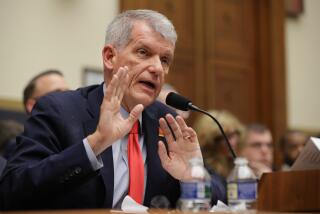U.S. Probe Targets Enron’s 401(k) Plans; Suit Filed
- Share via
The Labor Department said Wednesday that it is investigating the way Enron Corp. handled its employee retirement plans, and a bank that manages union retirement funds sought to freeze the personal bank accounts of Chief Executive Kenneth L. Lay and 28 current and past officers and directors of the crumbling Houston energy trader.
Elsewhere, one Wall Street analyst predicted that Enron will not recover from the flight of its trading partners and will be forced to liquidate.
The parent company and 13 subsidiaries filed Sunday for protection from creditors under Chapter 11 of the U.S. Bankruptcy Code, which allows the company to continue operating while it works out a plan to repay creditors.
Enron added another subsidiary Monday and three more late Tuesday. That brings the assets in the proceeding to slightly more than $50billion, solidifying its ranking as the largest such filing in U.S. history, and debts to $31.6 billion.
Enron’s 21,000-person work force shrank by 4,000 Houston employees Monday, after 1,100 layoffs in London on Friday. Enron has dubbed its fired employees “alumni” and has set up a special section on its Web site for them.
The company’s shares continued to recover Wednesday, closing at $1.01 on the New York Stock Exchange, up 14 cents, though that compares with a price of nearly $85 a year ago.
The decline has wiped out the bulk of the retirement savings of Enron’s employees as well as other pension funds that invested in the stock, sparking several lawsuits.
Labor Secretary Elaine Chao said her department is examining Enron’s handling of its retirement plans, including the freezing of trading in its 401(k) plan just before its stock price plummeted.
“Enron’s employees have gotten the short end of the stick in the sudden collapse of this company, and we are committed to doing everything we can to help them,” Chao said.
The latest lawsuit was filed not against Enron but its officers and directors, accusing them of reaping $1.1 billion from insider trading.
Amalgamated Bank, which is owned by the Union of Needletrades, Industrial & Textile Employees, accused company executives of “a grotesque fraud,” naming Lay, former Chief Executive Jeffrey K. Skilling and former Chief Financial Officer Andrew S. Fastow in its suit.
Skilling resigned in August, citing unexplained personal reasons. Fastow, who was pushed out in October, ran some of the off-balance-sheet partnerships that led to Enron’s rapid decline and investigations by the Securities and Exchange Commission and Congress.
Amalgamated said the equity and bond funds it manages, which hold the retirement savings of union employees, lost about $10.3million in the collapse of Enron’s stock and bonds.
An Enron spokeswoman did not return a call seeking comment on the lawsuit.
“Based on our own ongoing investigation, we believe the chicanery and financial manipulations at Enron were far more widespread than the company has admitted,” said Bill Lerach, a lawyer with San Diego-based Milberg Weiss Bershad Hynes & Lerach, which filed the suit in U.S. District Court in Houston on behalf of anyone who bought Enron stock between Oct. 19, 1998, and Nov. 27.
The suit seeks an injunction to freeze the personal bank accounts of those named, including board member Wendy Gramm, a former chairwoman of the Commodity Futures Trading Commission and wife of Sen. Phil Gramm (R-Texas).
Whether Enron will be able to reorganize remains in doubt. The company has lined up $1.5 billion in financing and is negotiating with its banks to form a joint venture to save its flagship energy trading operation, which once accounted for 60% of its profit.
On Wednesday, the Internet version of Enron’s energy desk was offering only 100 products for viewing, down from more than 1,700 in healthier days.
The trading business “is effectively shut down and Enron’s former customers and counter-parties are rapidly learning to live without Enron,” said Andre Meade, energy analyst with Commerzbank Securities, who has a “sell” rating on Enron stock.
“We believe it is unlikely that Enron can successfully restart this business,” he said.
Without that key trading business, Meade said, Enron’s only option would be to liquidate.
More to Read
Inside the business of entertainment
The Wide Shot brings you news, analysis and insights on everything from streaming wars to production — and what it all means for the future.
You may occasionally receive promotional content from the Los Angeles Times.










